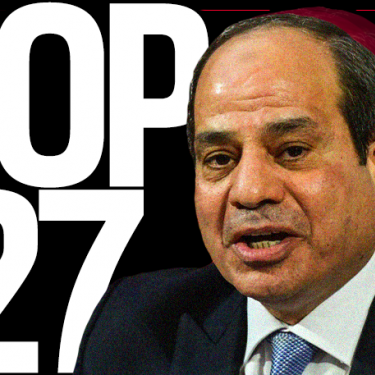“Green journalists” weren’t targets in Egypt, but that could change with COP 27

As the climate is not one of its priorities, the Egyptian government has not harassed environmental journalists with any particular assiduity in the past, but they risk becoming targets now that Egypt is hosting the UN’s COP 27 climate change conference from 6 to 18 November, Reporters Without Borders (RSF) warns.
“If Egypt takes the climate seriously, if it cares about life on this planet, it must prove it by releasing its 23 imprisoned journalists,” said Jonathan Dagher, the head of RSF’s Middle East desk. “It is Egypt’s journalists and in particular the environmental journalists who will judge whether the country keeps its COP 27 promises.”
Filming bans, surveillance, arrest, imprisonment, smear campaigns and murder are just some of the methods used to harass journalists – regardless of their specialisation – in the country ruled by Field Marshal Abdel Fattah al-Sisi.
Most of the subjects covered by journalists risk eliciting an angry reaction from the authorities but the climate has not been one of them until now. Far from being an encouraging sign, this has just been an indicator of how little attention the government pays to the environment. But this could change radically as a result of the COP 27 conference that is about to begin at the Egyptian Red Sea resort of Sharm El Sheikh.
Several environmental journalists contacted by RSF fear that the climate’s transformation into a matter of national policy linked to Egypt’s revenue means that the authorities will begin paying more attention to their work.
Signs of increased security tension
“The climate is going to become a political subject in the government’s eyes,” RSF was told by Nada Barakat, a journalist who covers the environment, agriculture and food security for the online newspaper Mada Masr. “If climate journalists like me tell the truth, namely that our government is destroying the environment, we will become obstacles.”
Field Marshal Sisi’s government has a grim reputation for silencing journalists who try to hold it to account. And signs of an increased security tension have been perceptible in the run-up to the COP 27 conference.
The police arrested the journalist Manal Ajrameh on 1 November for writing a critical post in a private Facebook group. Ajrameh does not specialise in environmental issues but her arrest just days before the start of COP 27 – amid growing international pressure for the release of Egypt’s 23 imprisoned reporters – can be seen as an alarming sign.
In both Cairo and Sharm El Sheikh, where the world’s leaders will gather, plainclothes police officers stop people in the street, examine their phones and scrutinise their private messages for any signs of dissent.
The message from the president’s office and the government is clear. Journalists must not treat COP 27 as an opportunity for making their voices heard, quite the contrary.
Environmental journalism getting more difficult
Aside from the ubiquitous surveillance of reporters and the permanent risk of imprisonment, journalists who work on the environment encounter constant obstacles gathering information in the field.
"Reporters working on the ways by which the government mistreats the environment have always been repressed," says Ariane Lavrilleux, a journalist who covered Egypt for various media outlets. "The difference is that with the COP, this repression is becoming more visible. The situation is getting worse by the day."
In a grotesque example of how “green journalists” are obstructed, one said the best way to take photos for a pollution story without being arrested was to pass yourself off as a tourist.
Another example is the “wall of silence” that environmental reporters seeking information face from officials, including administrative ones, on the government’s explicit orders. This even applies to the spokespersons of the ministries most directly responsible for protecting nature and exploiting natural resources.
Statistics are described as a “shambles” when not a complete “void.” So, data about subjects related to the environment is hard to find in Egypt. When available, which is rare, it is unreliable and often contradictory.
In such circumstances, and against a backdrop of violent and systematic repression, “green journalists” question whether they will be able to continue doing fulltime environmental reporting.
With 23 journalists currently imprisoned, Egypt is the fourth biggest jailer of media workers in the Middle East and the eighth in the world.

